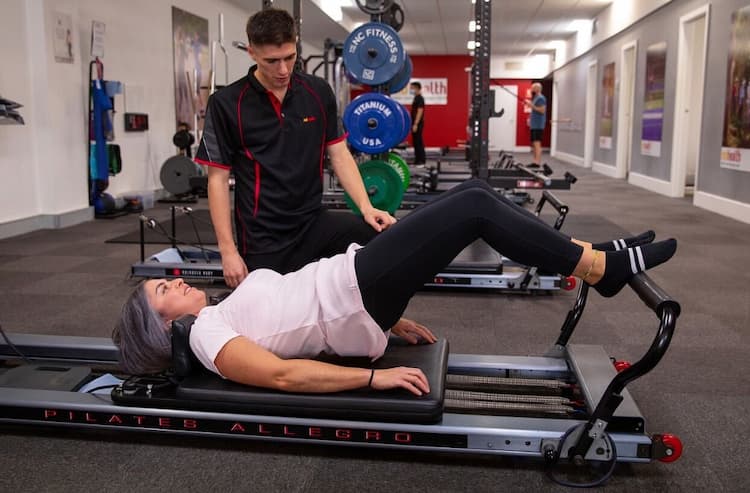Pilates, especially clinical reformer Pilates, is a game-changer for your body’s hidden strength. It allows you to target and strengthen those often-neglected, deep muscle groups that fundamentally improve your movement, control and stability. These are the muscles around the joints that you can’t see in the mirror but play a very important role in movement quality and performance.
When you master your movement quality through clinical Pilates, you will:
- Walk taller with improved posture
- Move freely, with greater control and poise
- Enjoy easier movement, with less effort and fatigue
Here are 3 key elements of movement mastery through clinical Pilates:
1. Mastering the small important stabilising muscle group with clinical Pilates
One of the biggest focuses of clinical Pilates is improving the control and strength of the small stabilising muscles around the joints, especially around the lower back and pelvis. When we work on our core stability through clinical Pilates, we aim to improve the activation and control of muscles such as:
- Multifidus: A small stabilising muscle that connects one vertebral segment to the other.
- Transversus abdominus: A very thin and deep abdominal muscle that helps control both intraabdominal pressure and the lower back vertebrae.
Activating and controlling these muscles helps each joint move smoothly, reducing strain and letting power muscles work effectively for strong, fluid movement without injury.
This balance and pattern happens throughout the body, not just limited to the lower back, resulting in high-quality, masterful movement.
2. Adding larger, compound movements once the stabilisers work through clinical Pilates
Working on the stabilising muscles through clinical Pilates is not enough. These muscles aren’t built for larger movements – they’re designed to support, not replace, the power muscles.
Once you’ve mastered the stabiliser activation, it’s time to focus on the power muscles. Building these larger muscles gives you the strength and capacity to lift and move the loads required for most activities in your life.
For example, around the lower back, the gluteal muscles (like the Gluteus Maximus and Medius) are powerful muscles that help you lift heavy loads with ease. To strengthen these muscles, consider a combination of:
- Progressive loading: Gradually increase the resistance of your clinical Pilates exercises that target these muscle groups to improve their strength and control.
- Functional exercises: Incorporate compound movements like deadlifts and squats to target these muscles and work them to their full potential, enhancing overall strength and performance.
By combining these approaches, you can significantly improve your movement quality and overall performance.
3. To master your specific movement needs, consult with a qualified clinical Pilates instructor
A qualified instructor, such as a physiotherapist, exercise physiologist, or osteopath trained in clinical Pilates, can assess your individual weaknesses, movement patterns, and muscle imbalances. They can then design a personalised exercise plan to help you achieve your goals.
Remember, a well-structured clinical Pilates programme, supervised by a qualified instructor, is the key to unlocking your full movement potential.
Do you have any questions?
Call us on (03) 9857 0644 or (07) 3505 1494 (Paddington)
Email us at admin@mdhealth.com.au
Check out our other blog posts here
Our clinical staff would be happy to have chat if you have any questions.
Take the first step to a healthier you!
Would you prefer for someone to contact you regarding booking your Initial Physiotherapy appointment, Initial Exercise Physiology, Initial Osteopathy session or FREE Full Body Assessment*?
Or do you have any other enquiry about our services at MD Health?
Please fill in this form and someone from MD Health will be in touch with you soon.
Alternatively please call us on 03 9857 0644 (Kew East), 03 9842 6696 (Templestowe), 03 8683 9442 (Carlton North) or 07 3505 1494 (Paddington) to book now!
For all new clients who wish to come in for a one-off, casual or adhoc basis for Physiotherapy or Exercise Physiology the Initial Physiotherapy or Initial Exercise Physiology appointment is a paid service.
** The 13 Week Clinical Pilates Program at MD Health is not a lock in contract and you are not required to attend for the full 13 weeks if you do not wish.
Get In Touch



